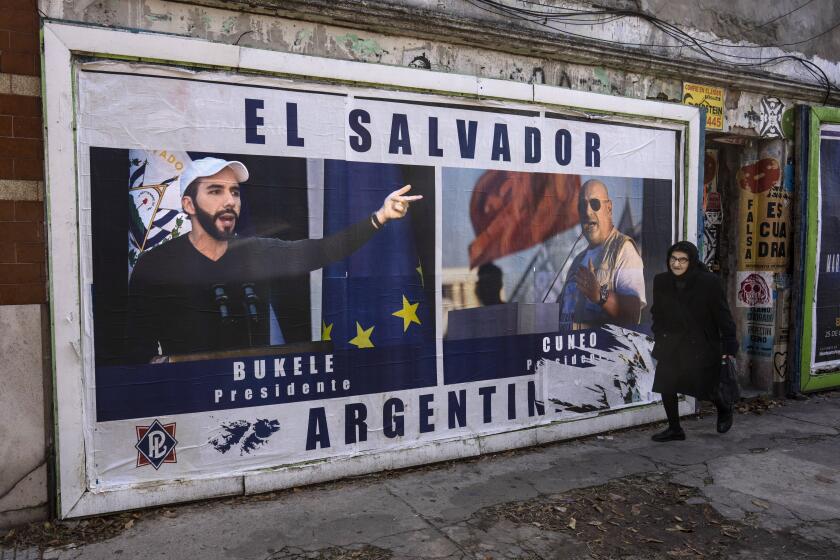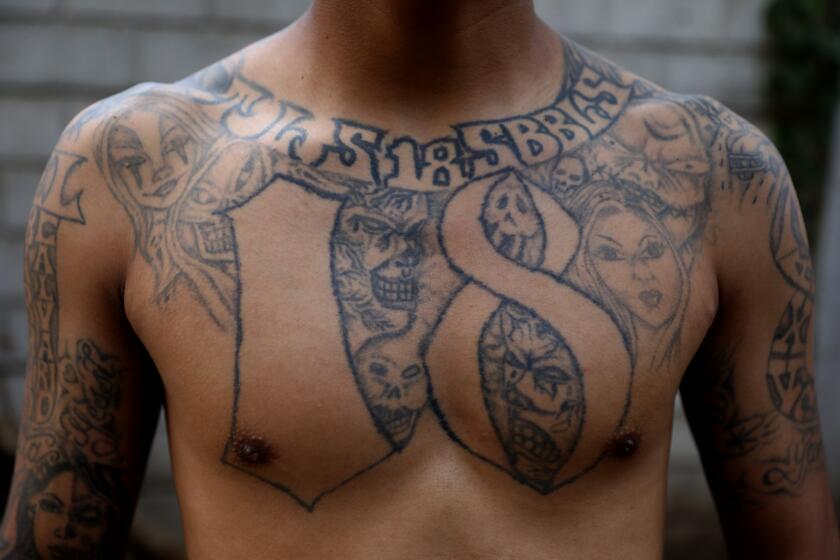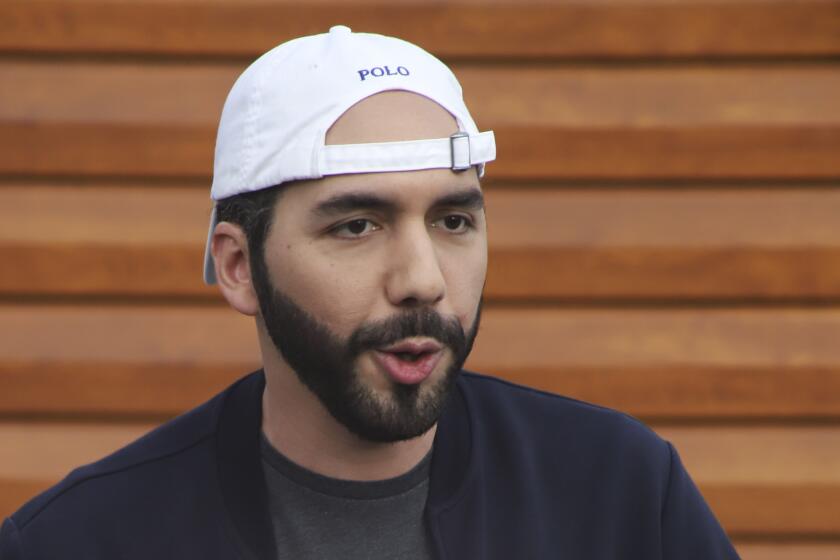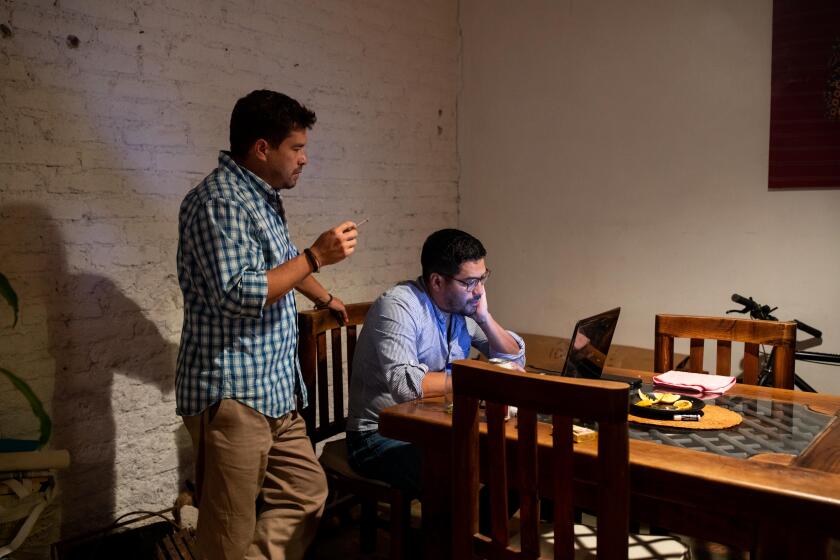El Salvador leader touts hosting Miss Universe pageant. Critics say he’s distracting from abuses of power
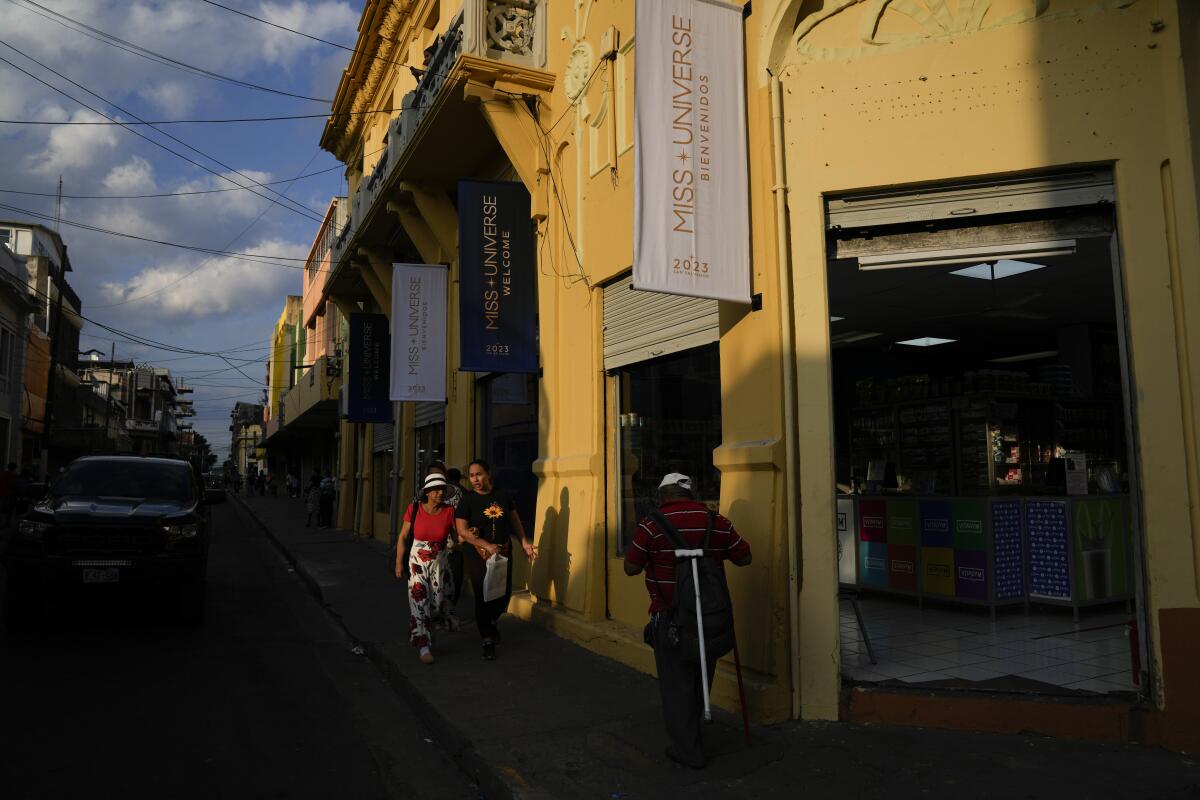
- Share via
MEXICO CITY — Video montages of pageant contestants in sashes enjoying El Salvador’s beaches, snapping selfies in front of fireworks and strolling through downtown San Salvador speckled social media last week as celebrations for the Miss Universe 2023 pageant kicked off in the Central American country.
“As President [Nayib] Bukele said, El Salvador is changing,” R’Bonney Gabriel, Miss Universe 2022, said in a speech before this year’s contestants. “While we’re here, we hope to shine a light on this country for the rest of the world to see.”
Saturday night’s competition was the latest spectacle promoted by Bukele in his effort to change the reputation of his historically violence-torn nation.
But opponents and analysts say such displays are also being used by the populist leader to distract from human rights abuses amid his crackdown on gangs and his efforts to curb criticism. Constitutional scholars and critics warn that he is slowly withering the country’s delicate democracy.
The Miss Universe pageant comes at a key time for Bukele, just months before February’s presidential election. He’s running for reelection despite clear term limits laid out in the nation’s constitution, a move that has upset watchdogs both in and out of El Salvador.
Politicians in Latin America are adopting Salvadoran President Nayib Bukele’s style — aviator sunglasses, leather jackets, baseball caps — and his politics.
“You give the public something to showcase to divert attention from the fact that you’re doing it while eroding the rule of law and democratic checks and balances in the country,” said Tiziano Breda, a Central America expert at Italy’s Istituto Affari Internazionali.
Bukele’s government did not respond to a written request for comment by the Associated Press.
Since he came to power in 2019, Bukele has made drastic changes in the country of 6.5 million people. Most notable has been his war on the gangs that have terrorized much of El Salvador for decades.
After a burst of violence last year that was blamed on gangs, he suspended some constitutional rights, and has since had more than 72,000 people locked up without due process on allegations of having gang ties.
He also has gone after journalists, labor organizers, human rights groups and other critics, and has mobilized an elaborate communications machine to spread propaganda.
El Salvador’s evangelical churches rehabilitated ex-gang members. The country’s crackdown on L.A.-born gangs like MS-13 emptied programs and filled prisons.
A sharp decline in violence after the crackdown on those suspected of ties to gangs gained Bukele strong support from most Salvadorans, and polls suggest he will coast to reelection.
But observers warn that there is a need to be concerned over human rights abuses and Bukele’s consolidation of power.
A 2022 U.S. State Department report cited “significant human rights issues,” and earlier this month several private citizens and opposition parties filed petitions with the Supreme Electoral Tribunal seeking to annul Bukele’s reelection bid.
With his carefully crafted social media presence and populist politics, Nayib Bukele has become one of the most popular politicians on Earth. Now just one question remains: What does he want?
The president, who once dubbed himself on social media the “world’s coolest dictator,” has taken the criticism largely in stride. At times he ignores detractors, and in other moments he forcefully accuses foreign governments of hypocrisy, all the while making bold spectacles a sort of trademark of his presidency.
In 2021, he announced in a recorded message played at a bitcoin conference in Miami that the cryptocurrency would become a national currency in El Salvador. Shortly thereafter, it became the first nation to take that step. Concerns were raised at the time, and the plunge in cryptocurrency’s value last year only fed the doubts. The government has not been transparent about its holdings, but analysts believe they remain at a sharp loss.
Bukele pivoted to new ventures and kept charging forward.
He hosted international surfing competitions and the 2023 Central American and Caribbean Games. Experts dubbed them a textbook case of “sportswashing” — using sports to divert attention from controversy or burnish reputations.
“Successfully hosting an international event can give a regime confidence to kind of act with impunity. Sport is a bit of a shortcut way to win yourself, not even popularity, just an acceptance,” Alan McDougall, a sports historian at the University of Guelph in Canada, told AP earlier this year.
Domestic projects like a new mega-prison for gang suspects and the sparkling national library unveiled last week are also presented to the public in carefully choreographed spectacles. The library event included drones that flew into the sky above the capital and arranged themselves in Bukele’s image.
The president does appear to be working to blunt criticism from the Biden administration.
Last month, El Salvador slapped a hefty fee on African migrants connecting to flights at its airport as the U.S. government pressured governments in the region to do more to control northward migration.
Journalists in El Salvador who write about gangs can now be sent to prison. Two brothers defy the law with a story tying President Nayib Bukele to violent street gangs.
The result has been what Breda, the Central American analyst, described as a “softer public denunciation” by the U.S. and other players in the region.
Now, as Bukele faces criticism for seeking reelection, the Miss Universe competition has quite literally taken the spotlight in the Central American nation.
“We now have become the safest country in Latin America. We would like to thank the Miss Universe Organization for joining us in this historic process,” Bukele said in a video announcing the event earlier this year. “El Salvador is changing.”
Social media influencers are commenting on contestants’ fashion choices, and showing competitors stepping onto the red carpet in elegant dresses and heels or doing yoga on the beach in their pageant sashes.
Contestants like Lisbeth Valverde Brenes, representing Costa Rica, sing Bukele’s tune to local content creators as she walks around the city center, praising El Salvador’s security and adding, “I’ll have to come back.”
And mixed in with the videos of the pageant on Bukele’s social media feeds — his preferred form of communication — are photos of him and supporters celebrating his reelection campaign.
His critics are pushing back.
The rights group Movement for Victims of the State of Emergency announced it will hold a protest as Miss Universe events wrap up.
“El Salvador isn’t a country of marvels,” the group said. “Bukele has converted it into a prison.”
Breda cautions that this all cuts two ways.
“For Salvadorans, this is a way to rebuild their national identity, seeing their country as one that’s being referred to as a tourist hot spot. … I see the good in that,” he said.
But, he added, “If that comes at the expense of democracy, the dismantling of checks and balances, I don’t know if that’s a net positive overall.”
More to Read
Sign up for Essential California
The most important California stories and recommendations in your inbox every morning.
You may occasionally receive promotional content from the Los Angeles Times.
